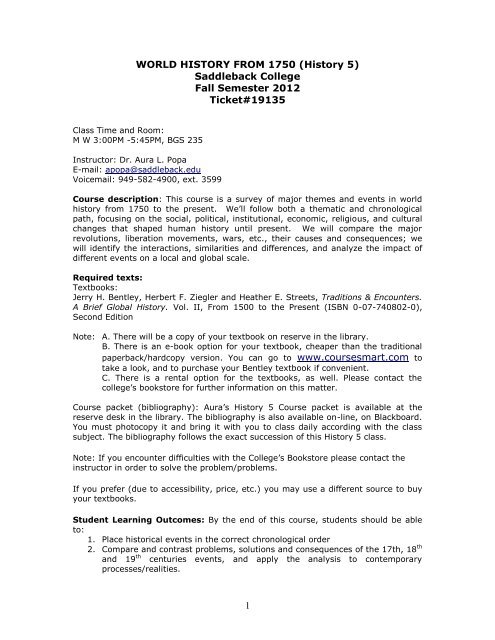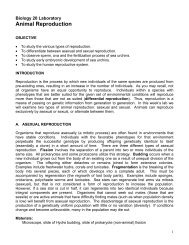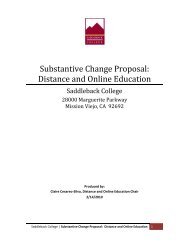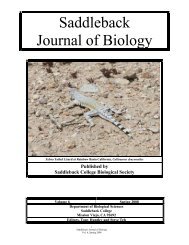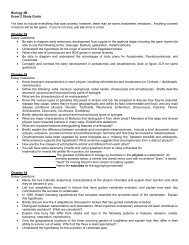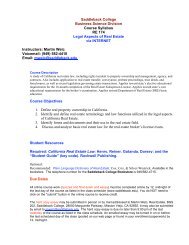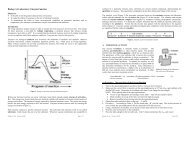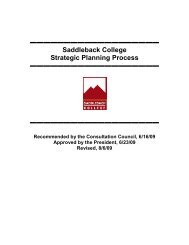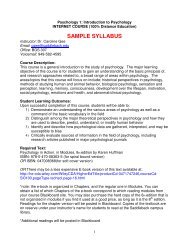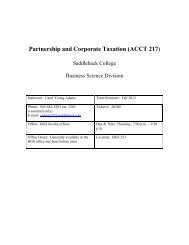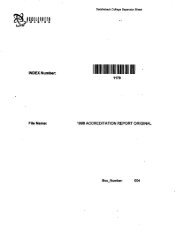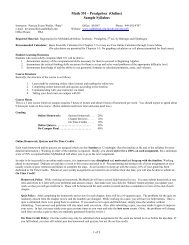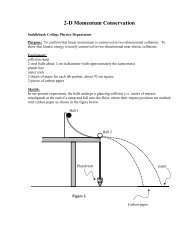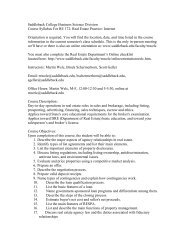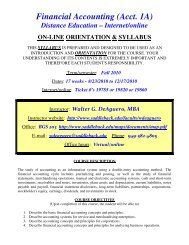1 WORLD HISTORY FROM 1750 (History 5) Saddleback College ...
1 WORLD HISTORY FROM 1750 (History 5) Saddleback College ...
1 WORLD HISTORY FROM 1750 (History 5) Saddleback College ...
Create successful ePaper yourself
Turn your PDF publications into a flip-book with our unique Google optimized e-Paper software.
<strong>WORLD</strong> <strong>HISTORY</strong> <strong>FROM</strong> <strong>1750</strong> (<strong>History</strong> 5)<br />
<strong>Saddleback</strong> <strong>College</strong><br />
Fall Semester 2012<br />
Ticket#19135<br />
Class Time and Room:<br />
M W 3:00PM -5:45PM, BGS 235<br />
Instructor: Dr. Aura L. Popa<br />
E-mail: apopa@saddleback.edu<br />
Voicemail: 949-582-4900, ext. 3599<br />
Course description: This course is a survey of major themes and events in world<br />
history from <strong>1750</strong> to the present. We’ll follow both a thematic and chronological<br />
path, focusing on the social, political, institutional, economic, religious, and cultural<br />
changes that shaped human history until present. We will compare the major<br />
revolutions, liberation movements, wars, etc., their causes and consequences; we<br />
will identify the interactions, similarities and differences, and analyze the impact of<br />
different events on a local and global scale.<br />
Required texts:<br />
Textbooks:<br />
Jerry H. Bentley, Herbert F. Ziegler and Heather E. Streets, Traditions & Encounters.<br />
A Brief Global <strong>History</strong>. Vol. II, From 1500 to the Present (ISBN 0-07-740802-0),<br />
Second Edition<br />
Note: A. There will be a copy of your textbook on reserve in the library.<br />
B. There is an e-book option for your textbook, cheaper than the traditional<br />
paperback/hardcopy version. You can go to www.coursesmart.com to<br />
take a look, and to purchase your Bentley textbook if convenient.<br />
C. There is a rental option for the textbooks, as well. Please contact the<br />
college’s bookstore for further information on this matter.<br />
Course packet (bibliography): Aura’s <strong>History</strong> 5 Course packet is available at the<br />
reserve desk in the library. The bibliography is also available on-line, on Blackboard.<br />
You must photocopy it and bring it with you to class daily according with the class<br />
subject. The bibliography follows the exact succession of this <strong>History</strong> 5 class.<br />
Note: If you encounter difficulties with the <strong>College</strong>’s Bookstore please contact the<br />
instructor in order to solve the problem/problems.<br />
If you prefer (due to accessibility, price, etc.) you may use a different source to buy<br />
your textbooks.<br />
Student Learning Outcomes: By the end of this course, students should be able<br />
to:<br />
1. Place historical events in the correct chronological order<br />
2. Compare and contrast problems, solutions and consequences of the 17th, 18 th<br />
and 19 th centuries events, and apply the analysis to contemporary<br />
processes/realities.<br />
1
3. Critically analyze, using historical evidence, three major turning points in<br />
world history from <strong>1750</strong> on.<br />
Course Structure: The weekly format will include: lectures and Microsoft Office<br />
PowerPoint presentations, discussions on the course readings and films, as<br />
appropriate.<br />
The PowerPoint presentations will be posted on Blackboard after each class lecture.<br />
Preparatory questions for quizzes and exams will also be posted on Blackboard prior<br />
to each quiz/exam. There will be no preparatory questions posted for the<br />
unannounced, open-book in-class exams on the weekly bibliography.<br />
To access Blackboard, go to http://socccd.blackboard.com, or you can click on the<br />
Blackboard Logo located at the top-left of this page, and enter your username and<br />
password. In the blank space next to the user name, type the first part of your<br />
<strong>Saddleback</strong> email user name (i.e. jdoe0). DO NOT TYPE THE ENTIRE SADDLEBACK<br />
EMAIL ADDRESS. And the password is your is your email password (default is your<br />
student PIN or the last four digits of your social security number + two zeros). Click<br />
the LOGIN button on the left site. The next screen takes you to the authentication<br />
page.<br />
Requirements and Policy: Attendance is very important in this course (in class<br />
discussions, presentations and films will complete the readings from the textbooks).<br />
It is necessary that students arrive at each class meeting on time (at 3:00PM)<br />
having completed their course readings.<br />
The student’s presence and participation is strongly encouraged, however,<br />
disruptions will not be tolerated. This non-academic behavior will be handled<br />
according with college’s policy. Please see the Student Handbook for more<br />
information on the disruptive behavior,<br />
http://www.saddleback.edu/media/pdf/handbook.pdf<br />
Students must turn off all electronic devices, especially pagers and cell phones upon<br />
entering the classroom. The students are allowed to use laptop computers in class<br />
for taking notes only. Computers and other electronic devices are not allowed to be<br />
used in the case of the unannounced open-book exams on the weekly bibliography.<br />
The instructor will drop any students who don’t attend the first two consecutive class<br />
meetings (10/15/12 and 10/17/12) prior to 10/24/12. Afterwards, the instructor will<br />
not drop any student. It is up to the students to drop the class in any other<br />
circumstance, if they so wish.<br />
Academic Dishonesty, in the form of cheating on exam or plagiarizing (intellectual<br />
theft by using someone else’s words as your own, and/or not citing other people’s<br />
work) the written work of others, is a serious offense and will not be tolerated in this<br />
course. To help someone cheat/plagiarize (for example to provide other student with<br />
your completed paper) is academic dishonesty, as well. The penalty of committing<br />
academic dishonesty will result in a zero grade on the assignment, and further<br />
disciplinary actions as per the college’s policy.<br />
2
Please see the Student Handbook for more information on academic dishonesty,<br />
http://www.saddleback.edu/media/pdf/handbook.pdf and/or visit<br />
http://www.saddleback.edu/sbs/AcademicDishonestyforStudents.html<br />
Missed Assignment/Exam Policy: Students are expected to complete all assignments<br />
and to take the exams (quizzes, essays, etc.).<br />
The only valid excuses for missing an exam are illness or a death in the family. All<br />
excuses are subject to verification by the instructor. With valid proof (e.g. note from<br />
the doctor, etc.), a written make-up exam will be administered for missed exams.<br />
Students have to contact the instructor, present the appropriate proof, and fill out a<br />
make-up exam request form (The make-up exam request form will be provided by<br />
the instructor upon request.). The make-up exams will be given no later than the<br />
week prior to the final exam. There will be no make-up examination for the written<br />
group project, the unannounced open-book exams from the bibliography, and the<br />
final exam.<br />
Bibliography: Students must bring bibliography to class daily, according with the<br />
class subject. Students are expected to read the bibliography for the current class<br />
before coming to class. There will be two unannounced, open-book in-class exams on<br />
the weekly bibliography (the lower grade will be dropped).<br />
Students must check their <strong>Saddleback</strong> <strong>College</strong> e-mail account (through MySite on<br />
http:/www.saddleback.edu) periodically; e-mail is the standard means of<br />
communication between students and instructor outside the class. If students prefer,<br />
they may forward the <strong>Saddleback</strong> e-mail account to an account that they regularly<br />
check.<br />
Note: Students will receive back all their exam sheets/assignments, for<br />
acknowledgment and results evaluation; all the exam sheets/assignments will be<br />
returned to the instructor after students’ review.<br />
Important dates:<br />
First class meeting- Monday, 10/15/2012<br />
Drop with refund- Friday, 10/19/2012<br />
Last day to drop without a “W” – Tuesday, 10/23/2012<br />
Last day to drop with a “W” – Wednesday, 11/28/2012<br />
Classes not in session – Wednesday, 11/21/2012<br />
Final exam - Wednesday, 12/19/2012 at 03:00PM<br />
Grading Policy:<br />
The following table shows the major assignments throughout the semester with the<br />
type of examination, the weight towards the final grade and the due date for each<br />
exam.<br />
Exam Type Date Weight<br />
Quiz 1 Multiple choice quiz 10/29/12 15%<br />
Quiz 2 Multiple choice quiz 11/14/12 15%<br />
Unannounced open book<br />
exams on the weekly<br />
bibliography<br />
Multiple choice questions<br />
and/or short essay question(s)<br />
Randomly 5%<br />
throughout<br />
the semester<br />
11/28/12 20%<br />
In-class exam In-class discussion and/or<br />
short essay question(s)<br />
Group project Essay (presented in class) 12/05/12 15%<br />
3
Final Multiple choice quiz 12/19/12 15%<br />
Note: A Scantron is required for each multiple choice quiz<br />
In brief:<br />
Quizzes - 30%<br />
Unannounced open book exams -5%<br />
In-class exam - 20%<br />
Group project – 15%<br />
Final exam – 15%<br />
Overall class activity – 15%<br />
Final letter grades will be based on the percentage of total points earned in this<br />
class. The following scale will be used in assigning final letter grades:<br />
90% - 100% = A<br />
80% - 89% = B<br />
70% - 79% = C<br />
60% - 69% = D<br />
≤ 59% = F<br />
Group Project (presented in class on 12/05/12) “How Societies Choose to Fail or<br />
Succeed” (no less than 700 words, no more than 900 words).<br />
The students are required to analyze the causes that led to the success or failure of<br />
one of the following societies described in the compulsory bibliography: Rwanda,<br />
Dominican Republic, Haiti, New Guinea, Japan and Tikopia, and to envision a<br />
scenario which would have led their chosen society to the opposite outcome.<br />
Compulsory bibliography:<br />
Diamond, Jared. Collapse. How Societies Choose to Fail or Succeed (New York:<br />
Penguin Books, 2006), p.277-308, 311-328, 329-357.<br />
Students are encouraged to use also other bibliography for this short essay.<br />
This essay is meant to be a research based on the compulsory bibliography, but also<br />
on other sources of students’ choice, which, however, have to be reliable and<br />
properly referenced (E.g. sites such as Wikipedia, do not always provide reliable<br />
sources).<br />
Attention need be paid to the authors/articles, books etc., used as sources in<br />
the essay, and to their proper quoting (the MLA rules have to be followed).<br />
Note: Further details regarding this assignment (such as the groups’ membership)<br />
will be provided to the students after 10/31/12.<br />
Student Support Services Available:<br />
There are several student support services available through <strong>Saddleback</strong> <strong>College</strong>. You are<br />
encouraged to take advantage of such resources including:<br />
Student Health Center<br />
The Student Health Center offers FREE medical and mental wellbeing services to all<br />
<strong>Saddleback</strong> <strong>College</strong> students (upon registration and the payment of the mandatory Student<br />
Health Fee). The Student Health Care Center is located in SSC-177. For an appointment call<br />
582- 4606. For more information on Student Health Center visit<br />
http://www.saddleback.edu/shc/<br />
4
LRC Tutoring Center (former LAP):<br />
The center offers free tutoring for <strong>Saddleback</strong> <strong>College</strong> Students in most areas. The LRC<br />
Tutoring Center is located on the second floor of the Learning Resource Center in LRC 212.<br />
Counseling: Counselors are available to assist students in areas of academic advisement,<br />
career planning, and personal counseling. For an appointment call 582-4572.<br />
Special Services for Students with Disabilities:<br />
Students who know that they require special accommodations in the course, or those who<br />
suspect that may have a learning disability, should contact the Special Services Office to<br />
obtain appropriate documentation and/or support services (phone: 582-4885, location –<br />
Student Services Center, room 113).<br />
Students should also speak with the instructor as soon as possible to ensure that their<br />
learning needs are met.<br />
I am available to help you and happy to do so! Please contact me with questions or concerns<br />
regarding the course or your academic performance.<br />
5
Course schedule<br />
Week 1 (10/15/12; 10/17/12)<br />
Introduction to Modern and Contemporary <strong>History</strong> and Civilization.<br />
Pre-modern Era<br />
Readings:<br />
Traditions & Encounters, Ch. 20, p. 387-409<br />
Magna Carta (on-line resource), articles: 14; 39-41<br />
Revolutions and National States in the Atlantic World (Part I)<br />
Readings:<br />
Traditions & Encounters, Ch. 25, p. 491-513<br />
Declaration of Independence (on-line resource)<br />
Declaration of the Rights of Man and Citizen (on-line resource)<br />
Week 2 (10/22/12; 10/24/12)<br />
Revolutions and National States in the Atlantic World (Part II)<br />
Note: The readings for Revolutions and National States in the Atlantic<br />
World (Part II) are the same as for Revolutions and National States in<br />
the Atlantic World (Part I)<br />
The Making of the Industrial Society<br />
Readings:<br />
Traditions & Encounters, Ch.26, p.515-533<br />
Manifesto of the Communist Party; Bourgeoisie and Proletarians,<br />
(Traditions and Encounters. A Brief Global <strong>History</strong>, vol. II, first<br />
edition), p.508<br />
The Americas in the Age of Independence<br />
Readings:<br />
Traditions & Encounters, Ch. 27, p. 535-553<br />
The American Reaction to the Chinese Immigration (The Human<br />
Record), p. 278-279<br />
Meaning of Freedom for an Ex-slave (textbook), p.552<br />
Week 3 (10/29/12; 10/31/12)<br />
Quiz 1 (Weeks 1-2) on 10/29/12<br />
The Building of Global Empires<br />
Readings:<br />
Traditions & Encounters, Ch.28, p. 555-577<br />
The Curse of Opium, Letter to Queen Victoria, 1839 (The Human<br />
Record), p. 312-313<br />
Film: Guns, Germs and Steel<br />
6
Week 4 (11/05/12; 11/07/12)<br />
The Great War: The World in Upheaval<br />
Readings:<br />
Traditions & Encounters, Ch. 20, p. 583-600<br />
Communist Decrees and Legislations (The Human Record), p. 360-62.<br />
Balfour Declaration (on-line resource)<br />
Wilson’s Fourteen Points (on-line resource)<br />
The Age of Anxiety<br />
Readings:<br />
Traditions & Encounters, Ch. 30, p. 603-617<br />
Adolf Hitler, Mein Kampf (The Human Record), p. 364-367.<br />
Week 5 (11/14/12)<br />
Quiz 2 (Weeks 3-4) on 11/14/12<br />
Nationalism and Political Identities in Asia, Africa and Latin America<br />
Readings:<br />
Traditions & Encounters, Ch. 31, p. 619-635<br />
Gandhi’s Vision for India- Indian Home Rule (The Human Record), p.<br />
405-408<br />
John Charles Chasteen, Born in Blood and Fire, p.213-221<br />
Week 6 (11/19/12)<br />
Film: Allies at War<br />
New Conflagrations: World War II (Part I)<br />
Readings:<br />
Traditions & Encounters, Ch. 32, p. 637-655<br />
Fuhrer, You Order, We Obey (The Human Record), p. 372-376<br />
A Hiroshima Maiden’s Tale (textbook), p.627<br />
Universal Declaration of Human Rights (Dec. 1948), on-line resource<br />
Week 7 (11/26/12; 11/28/12)<br />
In-class exam based on the material covered during Weeks 5-7(11/14/12-11/26/12)<br />
due on 11/28/12<br />
New Conflagrations: World War II (Part II)<br />
Readings:<br />
Truman Doctrine (on-line resource)<br />
Marshall Plan (on-line resource)<br />
NATO Treaty (on-line resource)<br />
Week 8 (12/03/12; 12/05/12)<br />
The Cold War and Decolonization. The Bipolar World<br />
Readings:<br />
Traditions & Encounters, Ch. 33, p. 657-677<br />
Nikita Krushchev on the Capitalist Iron Curtain (textbook), p. 644<br />
Mikhail Gorbachev, Perestroika (The Human Record), p. 462-463<br />
7
World’s Reaction to Vietnam (on-line resource)<br />
The group project based on Jared Diamond - Collapse. How Societies Choose to Fail<br />
or Succeed; Due to be presented in class on 12/05/12.<br />
Week 9 (12/10/12; 12/12/12)<br />
The End of the Cold War. From Dissent to Dissolution<br />
Film: Ceausescu: The Unrepentant Tyrant<br />
Readings:<br />
Traditions & Encounters, Ch. 33, p. 677-682<br />
Stokes, Gall, The Walls Came Tumbling Down, p. 158-167<br />
A World without Borders<br />
Readings:<br />
Traditions & Encounters, Ch. 34, p. 685-703<br />
Deng Xiaoping, Speeches and Writings (The Human Record), p.457-<br />
459<br />
Carter to Khomeini (on-line resource)<br />
Final exam on Wednesday 12/19/12 at 03:00PM in BGS 235.<br />
The Final will include questions from the material covered during Weeks 8-9<br />
(12/03/12-12/12/12).<br />
8


